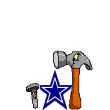Heroin reported in Tuinei's death
By C. Bryson Hull, Associated Press writer
McKINNEY, Texas -- Former Dallas Cowboys star Mark Tuinei went to an apartment to obtain heroin the night before he died and apparently used it as well as the drug Ecstasy, one of the team's players told police in a court document.
The document, which investigators filed to get a warrant to search Tuinei's house, contains information from Cowboys running back Nicky Sualua, who said he spent Wednesday evening with Tuinei in a Dallas apartment. Sualua said he and Tuinei went to the apartment to get the heroin and "Mark went into the bedroom, and he said, 'Here it is.'"
"When Mark came back to the living room, he looked as if he was passing out. Nicky advised (that) Mark started having problems and stopped breathing," the affidavit said.
Sualua said Tuinei was alive when he dragged the 6-foot-5, 320-pound ex-offensive lineman from the apartment to his car. Sualua then drove to Tuinei's house in Plano, suburban Dallas.
Sualua got two blankets from the house and slept in the car with Tuinei until about 5:30 a.m. Thursday, he told police.
"When Nicky woke up, Mark was not breathing," the document said.
In a 911 tape released Friday, a man identified as "Nicky" told the dispatcher that his friend had stopped breathing. "I can't feel a pulse," he said.
The 39-year-old Tuinei was pronounced dead at the hospital. The preliminary autopsy report was inconclusive and further toxicology tests were expected today.
Dallas police said yesterday that since Thursday, they have arrested three people at the apartment on various charges, ranging from heroin possession to public intoxication.
Tuinei's death and Sualua's report of drug use were just the latest blows to the Cowboys, whose image has been tarnished by a series of court cases and off-the-field problems in the last few years.
In addition to heroin, Sualua said Tuinei had used Ecstasy, a hybrid of the hallucinogen mescaline and the stimulant amphetamine, at Tuinei's house earlier Wednesday evening, according to the document filed with Collin County Court-at-Law Judge Mark Rusch, who issued the search warrant. McKinney is the Collin County seat.
Police seized marijuana pipes, a marijuana cigarette, a white tablet, a cell phone and papers with phone numbers from Tuinei's house, according to an inventory attached to the affidavit, details of which were first reported by TV station KDFW.
Police sought a search warrant because Tuinei's wife, Pono, was in their home state of Hawaii. The couple planned to move there so Tuinei could be an assistant football coach at his old high school.
Tuinei played 15 seasons for the Cowboys before retiring in 1998 and was a key player on three Super Bowl championship teams.
Cowboys spokesman Rich Dalrymple and NFL spokesman Greg Aiello declined to comment on Sualua's situation. Under NFL rules, players involved in drug-related violations of the law can be disciplined.
Tuinei was arrested a number of times in college for drunken brawling and he admitted to mixing alcohol with marijuana when he was young. In 1993, he told The Dallas Morning News that he could not say he had turned his life around.
"It's a day-to-day, year-to-year battle," he said. "I know that I'm always going to run into trouble of some kind. I just need to make sure I handle it."
Among other cases that have tarnished the Cowboys' image, All-Pro receiver Michael Irvin was suspended by the NFL in 1996 after a cocaine charge, and then-coach Barry Switzer was arrested in 1997 for taking a gun to Dallas-Fort Worth International Airport. In between, several other Cowboys faced drug- or alcohol-related league suspensions.
Last year, there was a mysterious training-camp scuffle in which lineman Everett McIver was stabbed in the neck with scissors by another player, reportedly Irvin.
Also, Pro Bowl defensive tackle Leon Lett has failed an NFL drug test for the third time, league sources said. The violation could carry a lifetime ban.


 No doubt.
No doubt.